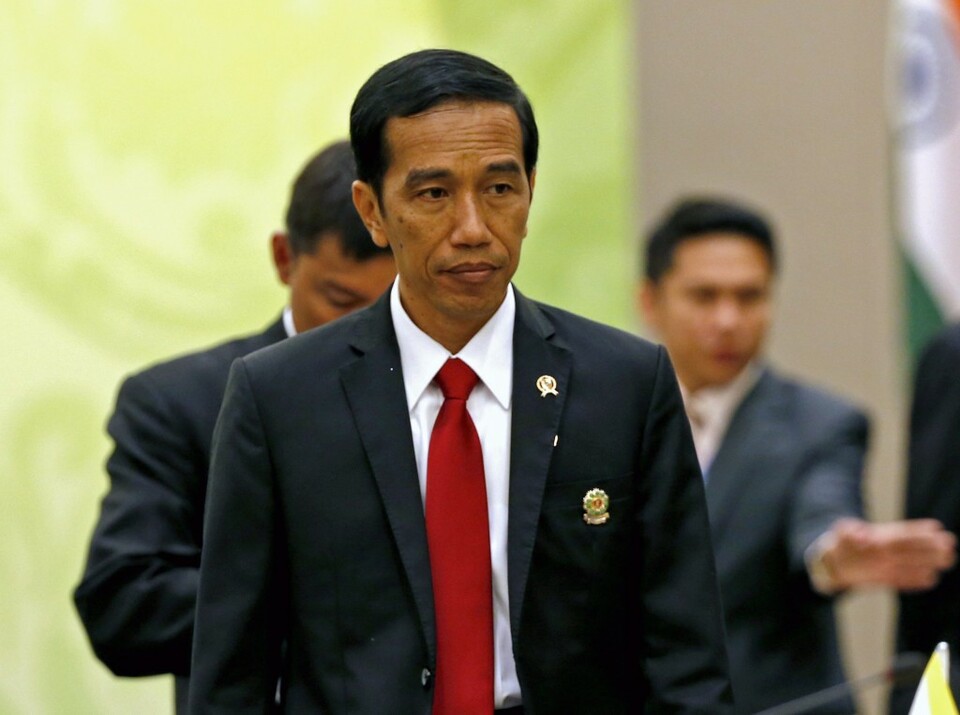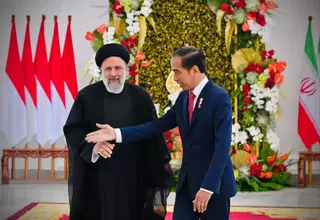Between Two Giants: Indonesia's Economy in the Balance

Jakarta. Indonesia has found itself positioned between two economic frameworks, facing a choice that could shape the future of the region.
Two competing free trade frameworks in the Asia Pacific region — the Trans Pacific Partnership (TPP) and the Regional Comprehensive Economic Partnership (RCEP) — have each come under strenuous review by regional powers.
The RCEP has been described in a statement by the Association of Southeast Asian Nations (Asean) as "a modern, comprehensive, high-quality and mutually beneficial economic partnership agreement establishing an open trade and investment environment in the region to facilitate the expansion of regional trade and investment and contribute to global economic growth and development."
Negotiations on the RCEP were formally launched in November 2012 by the 10 Asean member states, along with key regional partners China, Japan, South Korea, India, Australia and New Zealand.
The TPP, meanwhile, has been described by the Office of the United States Trade Representative describes as an "agreement that will enhance trade and investment among the TPP partner countries, promote innovation, economic growth and development, and support the creation and retention of jobs."
Thus far, four nations have signed on to the TPP: Brunei, Chile, New Zealand and Singapore. A further eight countries are currently in the negotiation stage, including the United States, Australia, Canada, Japan, Malaysia, Mexico, Peru and Vietnam.
On Wednesday, Indonesian foreign ministry officials reaffirmed the country's current stance of non-participation in TPP negotiations.
Agus Syarip Hidayat, a researcher with the Economic Research Center at the Indonesian Institute of Sciences (LIPI) views the TPP as a check against the growth of China’s influence in the Asia Pacific region through institutions like the RCEP, saying that "the US has strong concerns over the emergence of China as the second largest economy in the world."
"Promoting the TPP without inviting China into negotiations is a soft scenario to repress China’s influence in the region,” Agus added.
Indonesia currently enjoys favorable economic relations with both China and the United States, particularly in the field of foreign direct investment opportunities.
According to data from the Indonesia Investment Coordinating Board (BKPM), China ranked 10th out of 58 on the list of foreign direct investors in Indonesia during the January to March 2015 period, with realized investments coming in at $75.1 million. The United States meanwhile ranks 5th, with realized investments of $292.1 million during the same period.
In total, the RCEP region would encompass over 3 billion people, and maintain a combined GDP of $17 trillion.
The TPP represents a market of 792 million people, with a combined GDP of $28.1 trillion.
Asean centrality: RCEP
As a framework sign by all 10 Asean states, the RCEP may be the most appealing option for national leaders intent on securing regional stability and security.
"The RCEP is good for not only Indonesia, but Asean as a whole. Asean centrality will be retained under the RCEP, which is necessary to support the Asean Economic Community that will take effect at the end of 2015," Agus said.
Only four Asean member states have formally entered negotiations on the TPP.
Lili Yan Ing, an economist at the Economic Research Institute for Asean and East (ERIA) highlighted the different incentives influencing decisions to join either economic institution, saying: "One of the objectives of RCEP is to improve Asean’s position as a production base in East Asia, while the main reason for joining TPP is to get broader export market access to the US, particularly for Vietnam."
Experts further note that the RCEP provides signatory states with a more reasonable scheme of liberalization than the TPP.
"The RCEP acknowledges that participating economies have different stages of development. It could provide special treatments and exceptions for member countries that need more preparation and adjustments in the given time period,” said Agus on Wednesday.
A shift towards the RCEP would be in line with Indonesian President Joko Widodo's pivot towards China as a regional ally.
"Over the years, relations between China and Indonesia have grown rapidly. We would like to see this momentum maintained and strengthened throughout President Joko Widodo's term," a representative from the Chinese Embassy in Jakarta said on Wednesday.
"China and Indonesia can work together to correspond their respective strategies and expand practical cooperation accordingly," added the representative, highlighting the compatibility of the Chinese's new Silk Road initiative and President Joko's vision of Indonesia as a global maritime fulcrum.
Since assuming office in October last year, Joko has visited Beijing twice. Joko has yet to visit the United States.
Yet, despite incentives to join in the RCEP as a regional framework, political obstacles could complicate international efforts.
Chinese relations with Asean member states Vietnam and the Philippines exploded in recent months, as renewed territorial claims in the South China Sea revived tensions in the region.
In an article on regional security published in the East Asia Forum recently, David Huang, an associate research fellow at the Institute of European and American Studies in Academia Sinica, noted that "while one may contend that high economic interdependence could be enough to prevent accidental conflicts, it is no panacea for regional instability."
"High economic interdependence did not prevent World War I and II," Huang added.
Heightened tensions in the South China Sea could result in a greater shift towards the United States on behalf of individual member states of Asean.
Three of the four Asean member states who have signed the TPP also hold claims to territories in the South China Sea, including Brunei, Malaysia and Vietnam. The Philippines, also a claimant in the dispute, has in the past expressed its interest in joining negotiations on the partnership.
Reward, and risks
Speaking on the role of the RCEP in the Southeast Asia region, the representative from the Chinese Embassy noted: "The RCEP helps promote further economic cooperation and regional integration. The RCEP is both mutually beneficial and inclusive."
"It's high time to enhance cooperation in the areas of trade, investment, as well as people-to-people exchanges, so as to bring more tangible benefits to our two peoples."
Eria's Ing also spoke on benefits to Indonesia, saying "Indonesia could benefit from the RCEP if Indonesia could attract investment and make herself as a base of regional production networks," she added on Wednesday.
Agus of LIPI concurred, stating: "The future trend of development will rely on Asian growth, not the US, not Europe. A strengthening of relations between Asean and China will be beneficial for both parties."
Despite the renewed drive for Indonesia to take part in international economic frameworks, national leaders must remain cautious in contending with the harmful impacts of trade liberalization.
A 2012 report by the US Agency for International Development and the Support for Economic Analysis Development in Indonesia program found that the Asean–China Free Trade Agreement of 2010 had detrimental impacts to certain sectors of the Indonesian economy, producing "substantial customs revenue losses because of participation in the agreement."
The agreement also affected Indonesia's competitiveness within the region, resulting in "China [gaining] the most at the expense of Indonesia in the Thailand market, by $55.4 million."
Addressing the issue of increased competition, Agus recommended that the Indonesian government must first take greater steps towards improving local conditions before liberalizing trade.
"The main challenge is how to improve our business environment, to attract investors particularly in the sectors that will be liberalized, particularly medicine. We must look into developing regional protection networks," Agus said.
Improvements in infrastructure, however, must also work towards establishing equitable conditions for the local workforce.
Initiatives like the TPP and other free trade agreements have come under fire from the United Nations, due to concerns about the potential to disrupt the protection of human rights.
A statement released by the United Nations Office of the High Commissioner for Human Rights on June 2nd said that "there is a legitimate concern that both bilateral and multilateral investment treaties might aggravate the problem of extreme poverty, jeopardize fair and efficient foreign debt renegotiation, and affect the rights of indigenous peoples, minorities, persons with disabilities, older persons, and other persons leaving in vulnerable situations."
Speaking on the challenge of development gaps and inequity in relation to establishing regional economic cooperation, Ing noted "Singapore’s income per capita is 64 times of that of Myanmar. This makes integration tough, particularly in terms of skilled labor mobility, opening up services sectors and investment."
"It should be kept in mind that globalization in any kind of forms would have to be submissive to national domestic objectives, and not the other way around," she added.
Tags: Keywords:POPULAR READS
President Jokowi Urges Global Restraint as Tensions Rise in the Middle East
President Joko "Jokowi" Widodo emphasized the importance of diplomatic efforts to prevent the escalation of conflict in the Middle EastKPK Identifies Sidoarjo Regent as Suspect in Corruption Probe
KPK has identified Ahmad Muhdlor Ali as a suspect in a corruption case involving the Sidoarjo Regional Tax Service AgencyEconomic Concerns Overshadow Security Worries for Indonesians in Iran
Indonesian citizens currently in Iran are more concerned about rising inflation than the security situation in the country.'Siksa Kubur' Review: Indonesian Horror with Solid First Act
The beginning part of "Siksa Kubur" is incredibly solid across many fields, including the visual storytelling.IDX Slides 2 Percent as Geopolitical Conflict Rattles Market Confidence
The IDX attributed the subdued performance of the index at the start of the week to the escalating geopolitical tensions in the Middle EastPopular Tag
Most Popular






















